This life sim gem perfectly captures the sunny nostalgia of a childhood summer vacation
Shin-chan: Me and the Professor on Summer Vacation finally brings a beloved Japanese game series out in English.
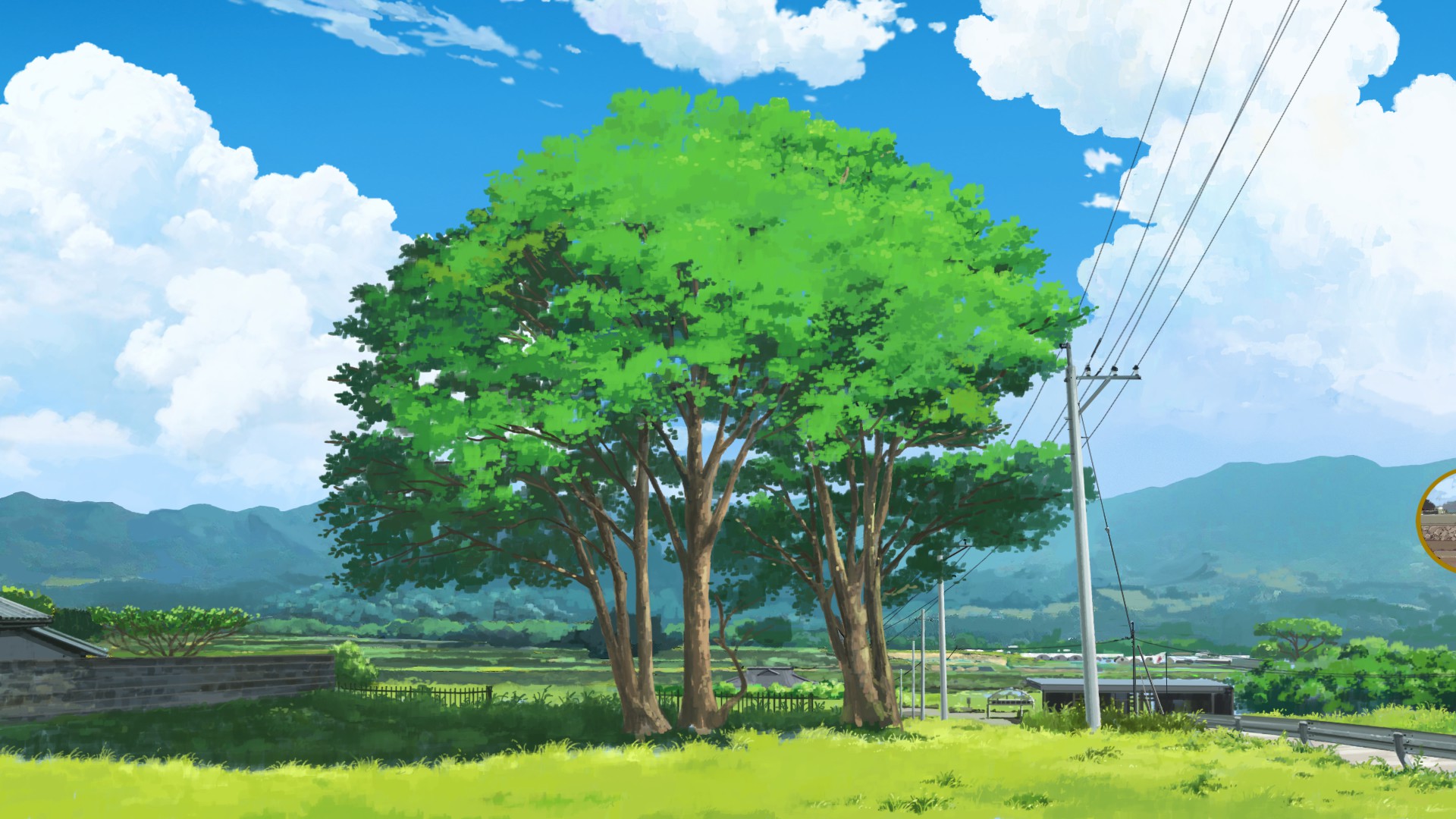
Technically speaking, Shin-chan: Me and the Professor on Summer Vacation is about a '90s anime and manga star spending a very strange week on holiday. There's an imperfect time loop, far more dinosaurs than any modern location should have, a curry-cooking ninja, and an ancient legend thrown into the mix—plenty to keep anyone occupied. But all of that's really just an excuse to give players a precious chance to tear around a small rural village in the carefree way only a five-year-old child could.
It's a simple idea—and one that could be easily misunderstood when viewed through gaming's overwhelmingly achievement-focused lens. When so many games tend to be designed to be exhausted just in time for the next wave of #content, something as gentle and unfussy as Shin-chan can feel wrong, as though the developer missed the global game design meeting. A playable summer holiday may sound like a great idea, but what are you actually supposed to do? There are extensive lists of fish to reel in and bugs to catch, and lots of errands Shin-chan can run for the local businesses. Those are all tasks to be completed, aren't they?
Well, yes… but also no.
If this game had to be pigeonholed into a genre, Shin-chan would probably be bundled into the same nameless box games like A Short Hike, Animal Crossing, and this same developer's Japan-only Boku no Natsuyasumi ("My Summer Holiday") series go in. They're games that, if they must be "about" anything, are about the joys of existing within small and supportive community-centred sandboxes, and looking damned cute while doing so.
There are plenty of defined goals to work towards—stories to follow up on, items to collect, new clothes to wear—but they're always presented more as a personal target, an optional something extra to help give the ongoing experience a little structure. There's always a lot that can be done, but very little that has to be done.
The relaxed pace is the key to enjoying Shin-chan's adventure. The endless supply of fish swimming in clear streams or in the shade of the village bridge aren't objectives to be grinded out until the digital supply's finally been fully catalogued after many repetitive hours. They're meant to be idly noticed as Shin-chan strolls by on another perfect summer's afternoon, and only fished if fishing sounds like fun in that exact moment.
Above: Turn the sound on and just soak in the atmosphere for a minute.
The biggest gaming news, reviews and hardware deals
Keep up to date with the most important stories and the best deals, as picked by the PC Gamer team.
The waiting, the sound of the water, the eventual catch via a simple, reaction-based pull—maybe it'll be something new to photograph, maybe it'll be something familiar the local restaurant wants to put on the menu in exchange for a little pocket money, maybe it'll be some genuine rubbish only fit for the bin. The experience is the point, not any quantifiable success or progression that might come from it.
Adjusting to this laid-back lifestyle sort of requires turning off your gamer brain, but if you can manage that, living Shin-chan's holiday becomes far more fun than completing any defined task ever could. There's pride and pleasure in this relaxed frame of mind, in savouring a pleasant moment just because it's there.
Summer Vacation isn't a realistic sim, but it captures the feeling of chasing butterflies in a favourite spot during a peach-coloured dusk and letting the sound of the cicadas drown out everything else. I always wanted to take the time to stand outside Shin-chan's neighbour's house to listen to the mother next door read her children a different short story every night on the porch, even though there's no tangible reward for doing so.
The people living within this small summery world still manage to feel relatable even with all of the dinosaurs running around thanks to an honest sort of fine detail, which deftly anchors what could have been a shallow and stomach-churning sickly sweetness to a very ordinary sort of reality. Shin-chan's adventure in Asso village always feels like a summer holiday I maybe could've had for myself, if only I'd visited the right aunt for the right week too many decades ago. Tufts of grass grow next to worn dirt paths, concrete corners, and car parks. Beautiful sunsets silhouette a telephone pole. A pair of mismatched tables are pushed together at breakfast. Two people like like each other, but struggle to find the right words when they're together.
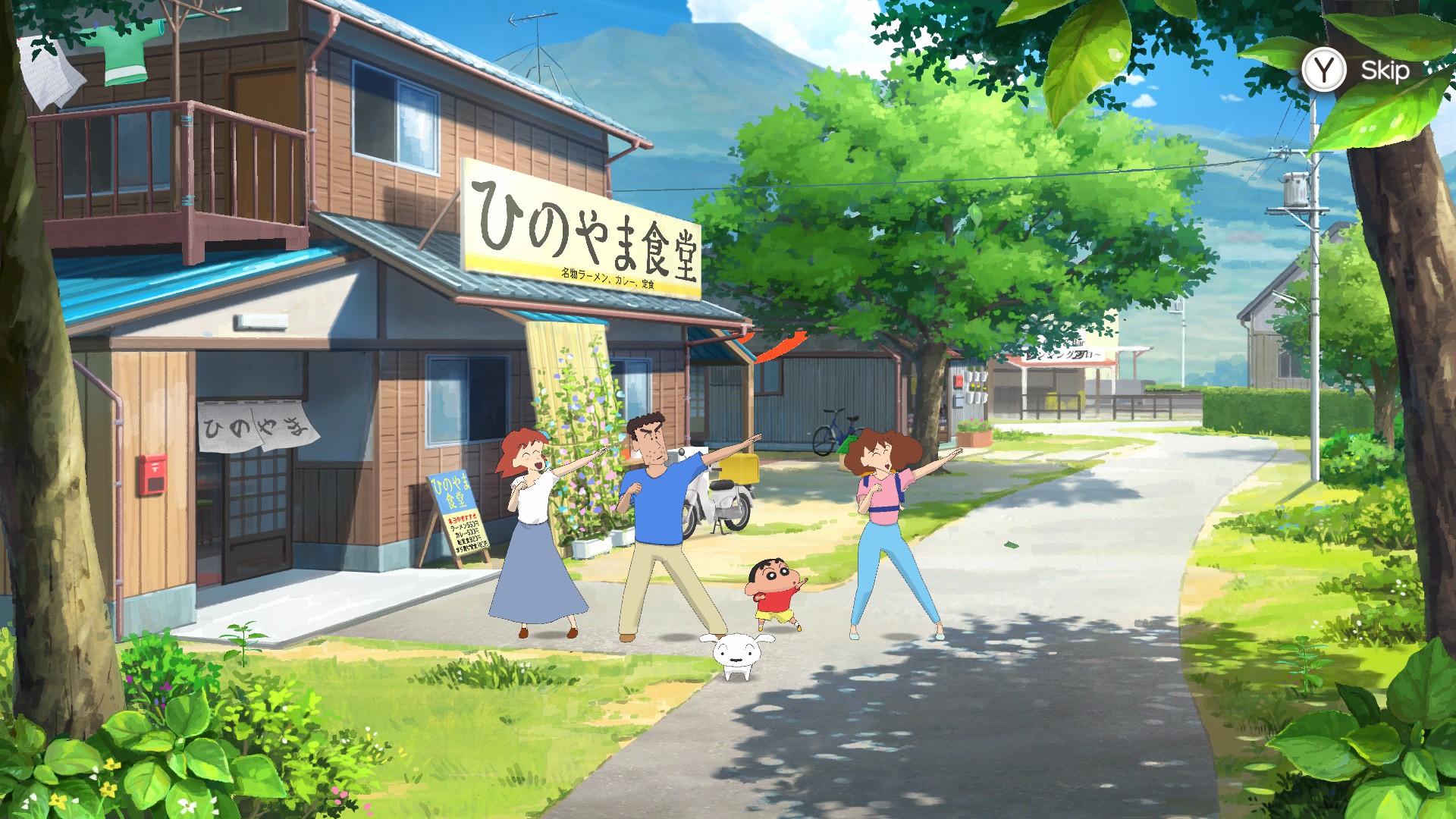
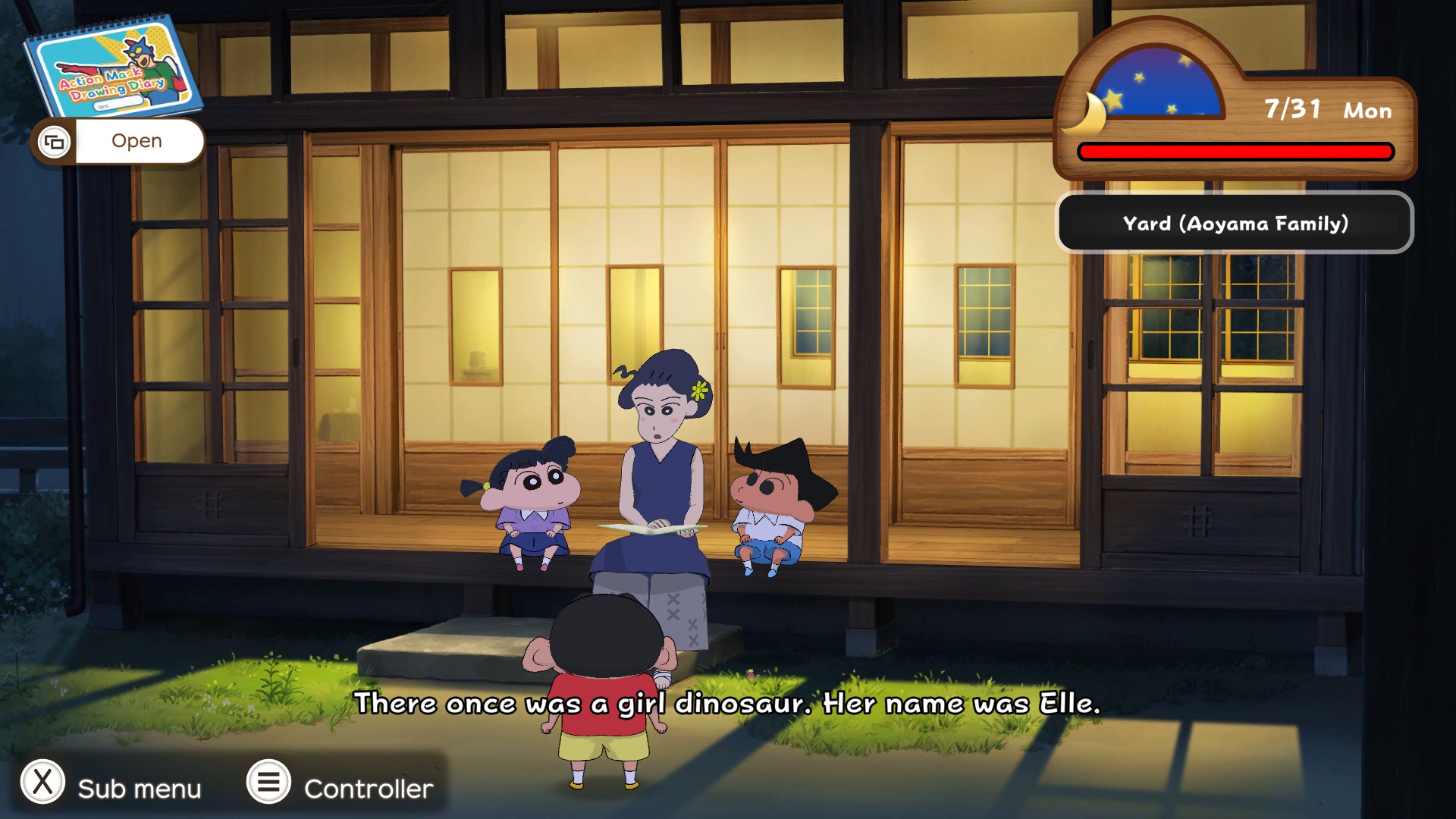
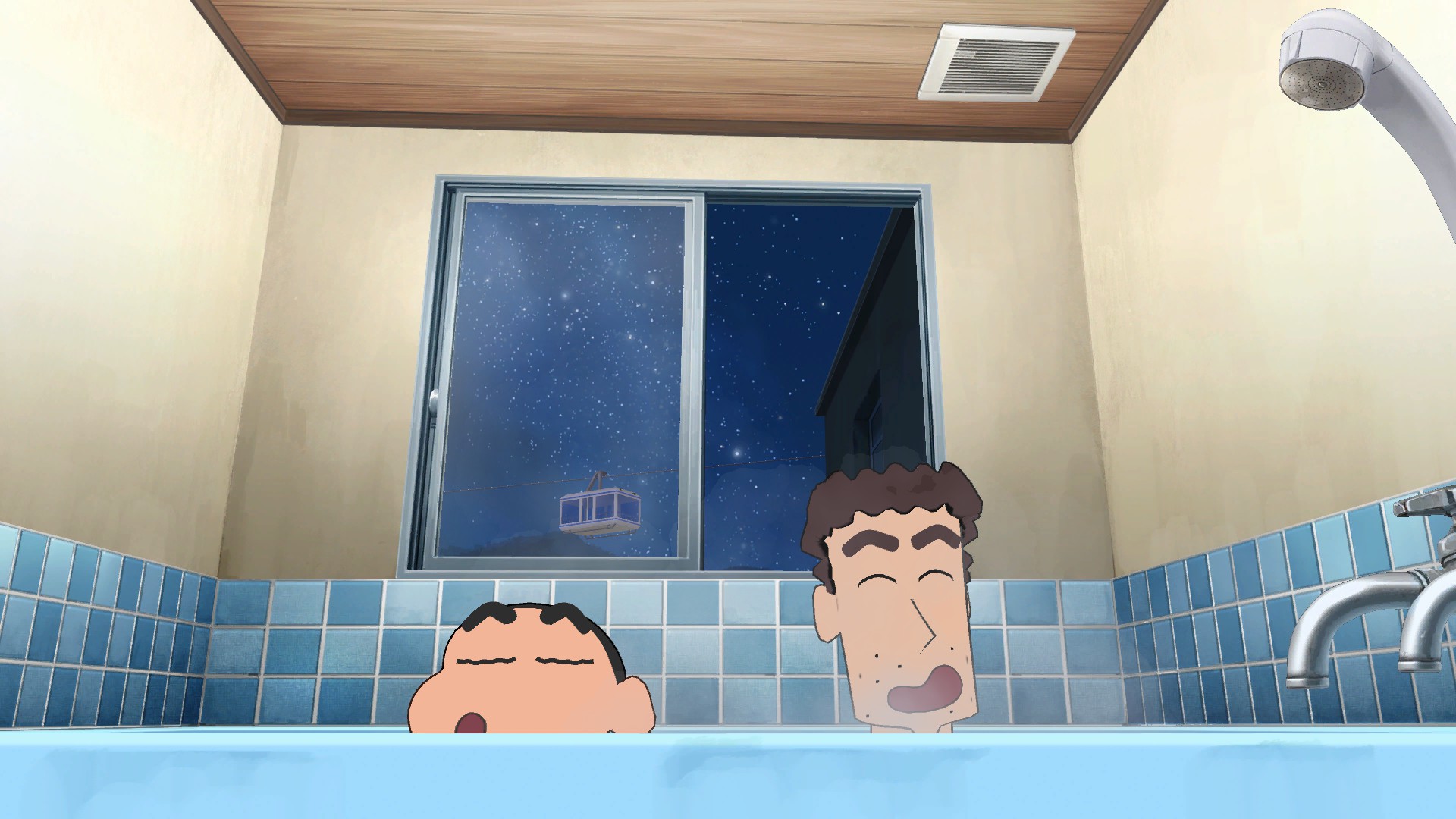
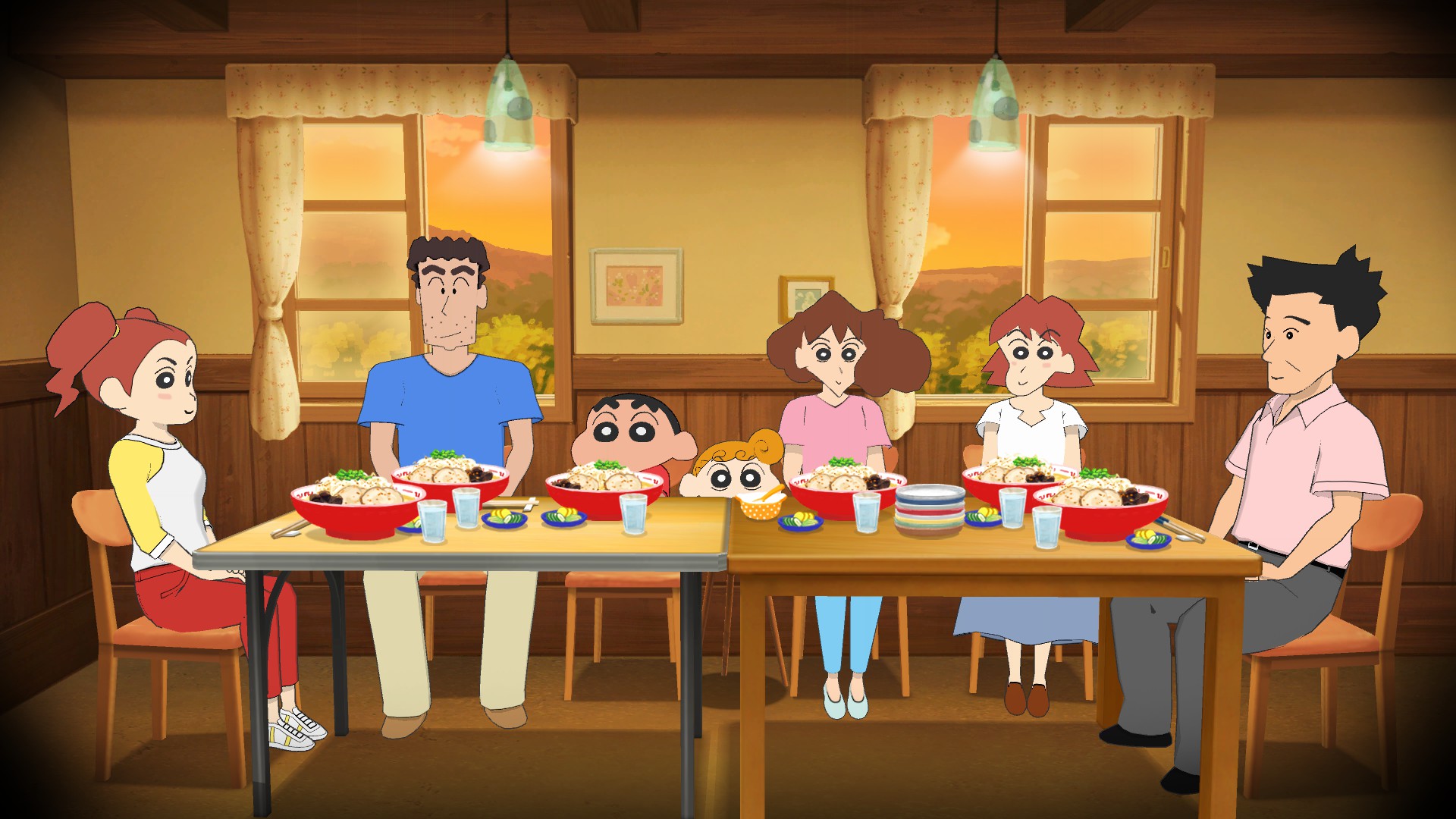
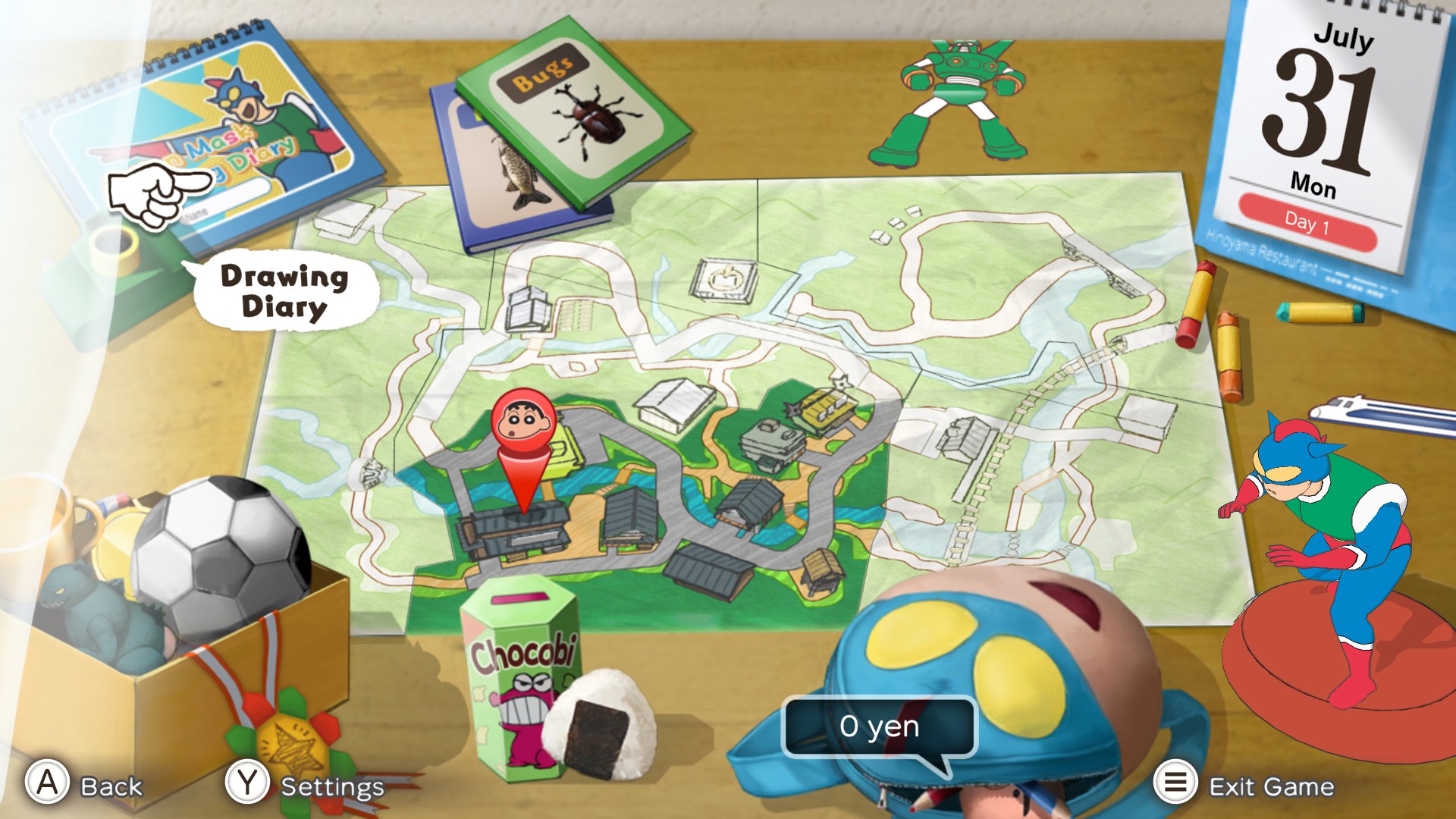

Shin-chan may be a cartoon character running around with his butt literally out in a game with its own resident "evil" professor, but the charm lies in how this strange little gremlin-child's escapades capture the spirit of a summer that almost was for all of us. It's a place just about real enough to linger in our imaginations, even if it's not somewhere we could truly visit.
In spite of its easygoing attitude it's not a long game (expect a start-to-credits run to take around 10 hours or so, even without a guide) but again, this is a carefully considered feature designed to enhance Shin-chan's sun-soaked atmosphere. An in-game day spent watering vegetables or playing with the local kids in a miniature robo-dino battle tournament can't be considered wasted if the "real" adventure's always so close at hand and so easily cleared, so why rush? Why not go investigate the local cows, learn the name of the beautiful pink blooms growing by the roadside, or even just watch fluffy clouds silently pass by near the top of the mountain?
Your summer will definitely be over before the next big game starts downloading anyway—the only problem is once you've gotten used to Shin-chan's carefree tempo, you might not be in such a rush to move on after all.

When baby Kerry was brought home from the hospital her hand was placed on the space bar of the family Atari 400, a small act of parental nerdery that has snowballed into a lifelong passion for gaming and the sort of freelance job her school careers advisor told her she couldn't do. She's now PC Gamer's word game expert, taking on the daily Wordle puzzle to give readers a hint each and every day. Her Wordle streak is truly mighty.
Somehow Kerry managed to get away with writing regular features on old Japanese PC games, telling today's PC gamers about some of the most fascinating and influential games of the '80s and '90s.

